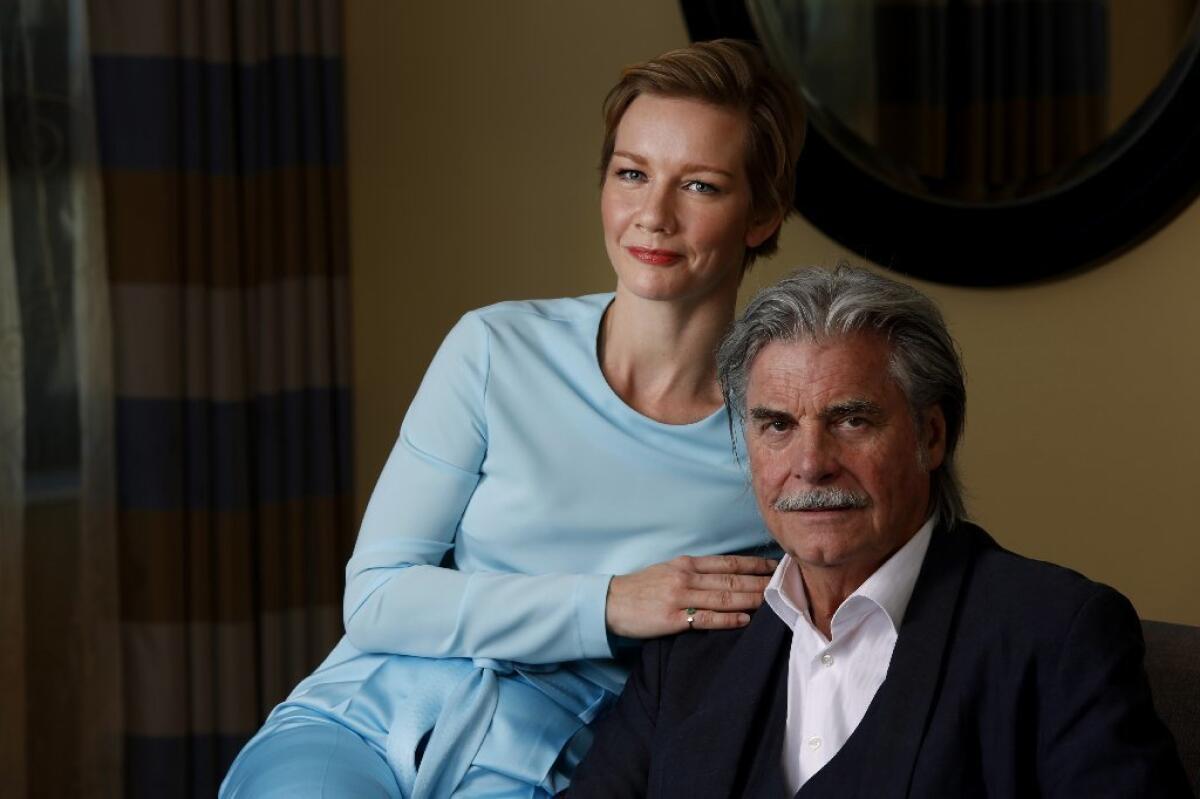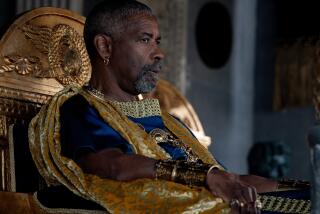Germany’s ‘Toni Erdmann’ actors ‘knew the work was good’

- Share via
Like few movies in recent memory, Maren Ade’s “Toni Erdmann” defies categorization. An outrageous comedy with a melancholy heart, it deploys a bad wig, a set of false teeth, a miniature cheese grater and a whoopee cushion while offering piercing glimpses of globalized corporate culture and boardroom maneuvers. But first and foremost, Ade’s third feature, a critical sensation at Cannes, is the story of a father and daughter and the emotional gulf that separates them.
They’re played, unforgettably, by Peter Simonischek and Sandra Hüller, stars of the German-language stage and screen. In Los Angeles recently, they found themselves the focus of Hollywood’s awards-season publicity machine and bolstered each other with playful glances during a pre-brunch photo shoot at the Beverly Wilshire. The glamour-tinged trajectory is perhaps an unlikely one for a film that clocks in at nearly three hours, with 52 speaking roles and a firm embrace of complexity over formula.
“Nobody expects anything like this. We are not in a business that is predictable in any way,” Hüller says. “But we knew that we were doing good work.”
That work began with a yearlong period of rehearsals. Assignments from Ade gave the actors a chance to try out their roles on an unsuspecting public. Wearing the conspicuously protruding false teeth that figure prominently in the story, Simonischek was tasked with visiting a mall on a perfume-purchasing mission. Embarrassment was the name of the game, as it is in the movie.
The title character is the alter ego of Simonischek’s Winfried Conradi, a retired music teacher who’s at loose ends after the death of his beloved dog. Traveling from Germany to Romania to visit Ines, his go-getter consultant daughter, he dons the goofiest of disguises and infiltrates her business-centric life, in the process creating moments that are as poignant as they are cringe-worthy and unsettling.
“I would like to be such a daddy,” says Simonischek, who has three sons. “I like the courage of Winfried Conradi. Because he changes and he goes so far.”
Through every twist and comic absurdity — not to mention Hüller’s belting rendition of a Whitney Houston song — the push-pull between Winfried and Ines, self-styled performance artist and his initially mortified daughter, is electrifying in its unpredictability.
Inevitably, unpredictable moments on set contributed to the screen dynamic, as when an uncooperative elevator made a painful silence between the central characters longer than intended. “That was a mistake,” Hüller says. “The elevator just didn’t come.”
“Maybe it was,” Simonischek says. “I’m not that sure.”
In conversation, Hüller tends to be expansive yet precise, while Simonischek, who occasionally asks his costar to translate a German word or phrase, offers succinct summations, peppering his comments with references to Edward Hopper, Chekhov and “The King of Comedy’s” Rupert Pupkin.
They amicably question or challenge each other at times, but are in complete agreement on their high regard for Ade — a sentiment that is, remarkably, undiminished by the director’s insistence on doing 15 to 30 takes of every scene.
Both of us were doing things that we’d never done before, in an intensity and a complexity that we’d never done before.”
— Sandra Hüller
The result, Hüller says, was worth the extra effort. “You feel when you work with her, as exhausting as it is, that something is going on. Both of us were doing things that we’d never done before, in an intensity and a complexity that we’d never done before.”
The visual language of “Toni Erdmann” revolves to a large extent around the contrast between the buttoned-up Ines’ power suits and the fearlessly awkward Winfried’s ridiculous get-ups. Beyond those teeth, a wig of long, unkempt hair is another key component of the Toni persona. They tried a hundred wigs, Simonischek says, and pulls out his phone to offer photographic evidence. He swipes from the image of him as a rock ’n’ roll Toni (shag haircut and shades) to one with childish bangs to a silver-coiffed version that reminds a delighted Hüller of filmmaker Michael Haneke. “With other teeth,” she quickly adds.
There were fewer choices to be made about her character’s look, but a certain “dress casting” was required to find just the right piece of clothing for a sequence that’s sure to be one of the most talked about in the movie. “We had to find one that fits really well and that I could get into but not out of.”
Recalling Ines’ clever use of a fork as a survival tip for women in tight dresses, Simonischek says with a smile, “You could take nothing from the film but this.”
Hüller interrupts, laughing but serious. “I wish they would take from the film ‘Don’t wear those dresses.’”
See the most read stories this hour »
ALSO:
On Writing: ‘Toni Erdmann’ is in a sense autobiographical, except for that naked party
Cannes: Why ‘Toni Erdmann’ could win the Palme d’Or and other predictions
More to Read
From the Oscars to the Emmys.
Get the Envelope newsletter for exclusive awards season coverage, behind-the-scenes stories from the Envelope podcast and columnist Glenn Whipp’s must-read analysis.
You may occasionally receive promotional content from the Los Angeles Times.









